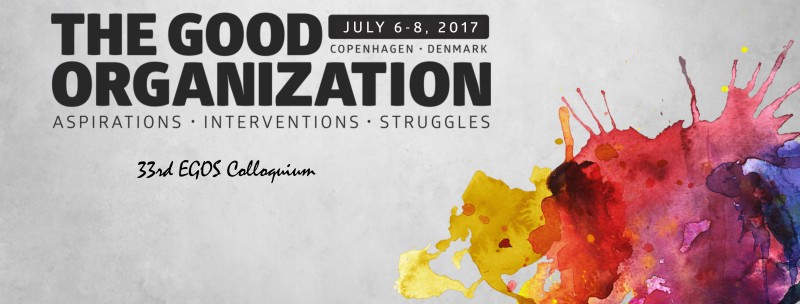Sub-theme 18: Civil Society Organizations: The Site of Legitimizing the Common Good
Call for Papers
At present, Civil Society Organizations (CSOs) are experiencing significant public and academic attentions, especially
as suppliers of social cohesion, promoting active citizenship and safeguarding the common and greater good in society through
their special characteristics and values. Accordingly, CSOs have been championing their contribution as the rescuer/savior
not just of the traditional welfare states but also of the national cohesion as such.
However, CSOs do not
by definition create social cohesion and contribute to the common good. Researchers have recently shown that many voluntary-based
associations, cooperatives, mutual funds, philanthropic organizations, transnational advocacy groups and, more recently, social
entrepreneurs to name but a few, have purposes closely related to their particulate interest and not necessarily directed
towards a common good (Alexander, 2006; Frantz & Fuchs, 2014). Even though their legitimizations and justifications often
are articulated as a collective engagement towards the making of a “better society” and a willingness to contribute to the
“Common Good” linked to positive characteristics of Civil Society, one cannot just study these organizations and associations
as a good per se (Dekker, 2014).
CSOs have to deal with an array of stakeholders with different and sometimes
divergent claims. It is often argued that CSOs have to deal with four different types of accountability upwards (donors),
outwards (alliance partners), inwards (workers and volunteers) and downwards (the beneficiaries) (Ostrower & Stone, 2015).
However, meeting the expectations of some stakeholders might spark tensions with others as well and we need to understand
how and to what extent these different accountabilities are articulated, prioritized as well as which consequences they have.
The concept of legitimacy within CSOs has been discussed and defined as; a lawful, admissible, and justified
organization (Edwards, 2000) or more recently, Alexander´s division between the civil and uncivil sphere (2006) and Lichterman
& Eliasoph’s (2014) identifications of civic action. As such, the legitimization of CSOs´ actions and existence is intertwined
with stakeholder accountability, contemporary “regimes” of justifications (Boltanski & Thévenot, 2006) and the range of
available institutional and organizational forms. Accordingly, CSOs must be studied for how and which specific
understandings of the common good and society they promote – and thus which consequences that entails – also in line of which
groups are found worthy of being included within the “Common Good” and which are not (Chambers & Kopstein, 2001; Reuter
et al., 2014).
In this sub-theme, we welcome empirical and theoretical contributions exploring the role the
common good plays in the relationships of legitimacy, justification and accountability. In particular, we welcome papers addressing
the following issues:
- Creating the common good of society: While organizations use the striving for a good society or safeguarding of the common good as a way to legitimize themselves, these legitimations also spill over and promote specific understandings of the common good and society. How do these processes take place? What are the consequences of these changes? And what type of politics/inclusion/exclusion do they conceal?
- Managing and institutionalizing legitimacy in Civil Society: How do CSOs manage and institutionalize their explicit role of doing well. To what extent is the organizational form a materialization of its legitimization? How do “professionalization” and “participative governance” work as a way to strengthen legitimacy? What are the different sources of legitimacy for CSOs? What are the institutionalization processes of the legitimate CSO?
- Managing accountability claims to strengthen legitimacy in Civil Society: How exactly do CSOs develop accountability systems and standards that enhance their legitimacy in civil society? How do CSOs order the different accountability claims made by their stakeholders? Which accountability mechanisms have emerged in recent times? What can be said about performance measurement systems, reporting and audited processes, and social impact evaluation that have spread into Civil Society as a necessary step to enhance accountability? Are these accounting and auditing practices a way to enhance performance, acquire resources or strengthen organizational legitimacy? To what extent does the push towards more accountability by some powerful stakeholders lead to tensions with other stakeholders whether internally and externally? Are there different modes of accountability depending on the type of relationship with the stakeholders?
References
- Alexander, J.C. (2006): The Civil Sphere. Oxford: Oxford University Press.
- Boltanski, L., & Thévenot, L. (2006): On Justification: Economies of Worth. Princeton: Princeton University Press.
- Chambers, S., & Kopstein, J. (2001): “Bad Civil Society.” Political Theory, 29 (6), 837–865.
- Dekker, P. (2014): “Tocqueville Did Not Write About Soccer Clubs: Participation in VoluntaryAssociations and Political Involvement.” In: M. Freise & T. Hallmann (eds.): Modernizing Democracy: Associations and Associating in the 21st Century. Heidelberg: Springer, 45–58.
- Edwards, M. (2000): NGO Rights and Responsibilities: A New Deal for Global Governance. London: The Foreign Policy Center.
- Frantz, C., & Fuchs, D. (2014): “The Impact of Civil Society on Sustainable Development.” In : M. Freise & T. Hallmann (eds.): Modernizing Democracy. Associations and Associating in the 21st Century. Heidelberg: Springer, 83–96.
- Lichterman, P., & Eliasoph, N. (2014): “Civic Action.” The American Journal of Sociology, 120 (3), 798.
- Ostrower, F., & Stone, M.M. (2015): “Governing boards and organizational environments: growing complexities, shifting boundaries.” In: J.-L. Laville, D.R. Young & P. Eynaud (eds.): Civil Society, the Third Sector and Social Enterprise. Governance and Democracy. London: Routledge, 75–90.
- Reuter, M., Wijkström, F., & Meyer, M. (2014): “Who Calls the Shots?
The Real Normative Power of Civil Society Modernizing Democracy.” In : M. Freise & T. Hallmann (eds.): Modernizing
Democracy. Associations and Associating in the 21st Century. Heidelberg: Springer, 71–82.


